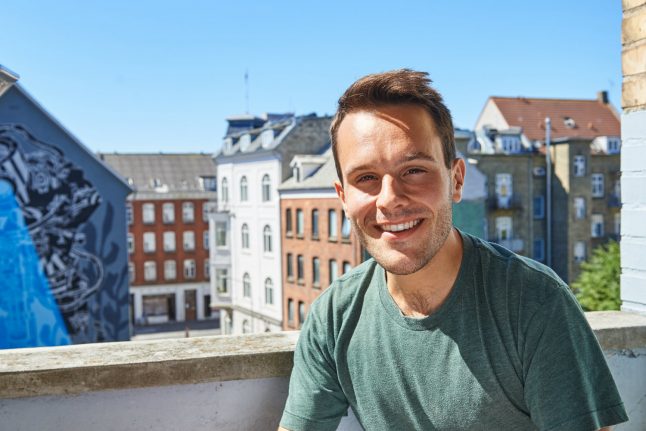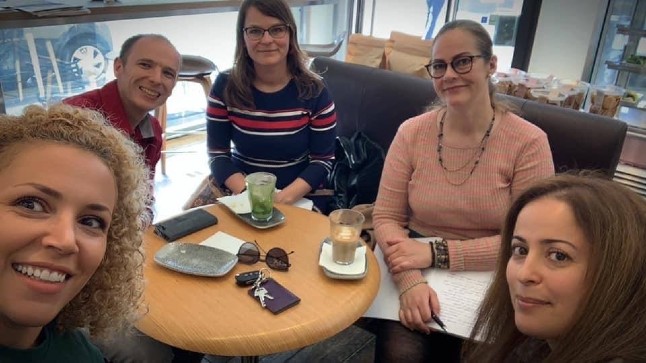Peditto and his Danish wife, who met each other through voluntary work in the United States, decided to move to Denmark while expecting their first child. The 25-year-old spoke to The Local about international relocation during impending parenthood, Danish friendship culture, and establishing his photography business in North Jutland.
What was your situation before you came to Denmark?
“We’d known each other for two years prior to moving here. We’d been staying in touch over Facetime and just had visits where she’d come over to me and I’d come out here to visit her, so we had a few of those trips back and forth.”
How does Aalborg compare to Philadelphia?
“That was one of the adjustments, just getting used to the physical space being smaller, but also the industry and the network of people, everybody seems to know each other here.
“I actually did some research on Google for the five or six months prior to moving here and found some people I thought could potentially be helpful for my freelance work and also in the long term, so I sent some emails hoping to pick up sponsors. There were people I didn’t hear back from, but from the few that did it proved to be fortuitous for me, not just in a business sense but also in a personal sense because I’ve been able to make friends with some of these people that I would otherwise probably not have met.”
Have there been other things that have helped you to settle?
“Under the terms of my residency I have to take language classes, and because of that of course I’m meeting people from all over the world. I’ve actually just finished those classes and they’ve been great, and we have different reasons for being here but are all new to Denmark and that’s something that’s kind of bonded us.”
Do you have any Danish friends?
“I think by reaching out early on to people I thought could be business partners or colleagues or whatever you want to call it, the friends I made there have slowly incorporated me into their friend groups and I’m trying to find my way into how to understand the etiquette of friendships here. I’ve been more observant than anything, just trying to understand how relationships grow over time here. I see how they’ve developed from an early age for people that grew up here, so I’m trying to work my way into friend groups without being too overbearing.”
You and your wife chose to settle in Denmark while expecting a child. What factors were involved in that decision?
“We’d played around with the idea back and forth, and the pros and cons (compared to the US) of laying roots either in a new place for her or a new place for me. I guess I took a big leap in trying it, but I think learning more about the Danish social structure and family structure, I think it was a safe bet in the sense that we’re much more comfortable economically speaking in not having to stress as much as we might have been in the States.
“The first three days (after the birth) we spent in the hospital, because it was funded through taxes, we didn’t have to pay anything out of our own pockets. In the States, whether or not we had insurance, there would have been some pretty high costs. From day one, that was something that made a huge difference to me.”
How do you find working in Denmark?
“I’m the only American photographer I know in Aalborg, to the best of my research. Not just that, my work just looks different. I mean, I come from a fine arts background due to the education I have from Philadelphia, but in Aalborg they don’t emphasise so much on the arts in a degree programme sense. You have these different schools where you can study but you don’t really come out with a degree, I think having spent four years studying photography it gives me a bit of an advantage, I’d say.”
How has Denmark changed your lifestyle?
“I think that brings me back to what I was saying before about being observant. I think because, on the surface, things look very similar in a lot of ways to the States – I go on the streets and I see companies from America and that’s been a sort of comfort, but underneath all that there’s this unknown culture to me, that I’ve just wanted to listen to.
“I don’t think I’ve ever spoken so little as I do at dinner parties at relatives’ homes in Denmark. Because of the language barriers of course, but also just really wanting to try to understand and out of respect for people here I want to learn as much as I can, because they’ve been so good to me so far.”
READ ALSO: 'Denmark's Jantelov is similar to what we call 'tall poppy syndrome''




 Please whitelist us to continue reading.
Please whitelist us to continue reading.